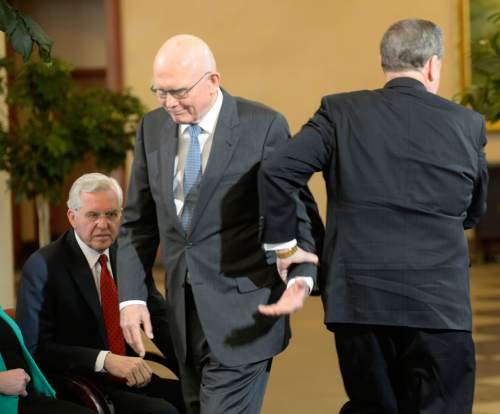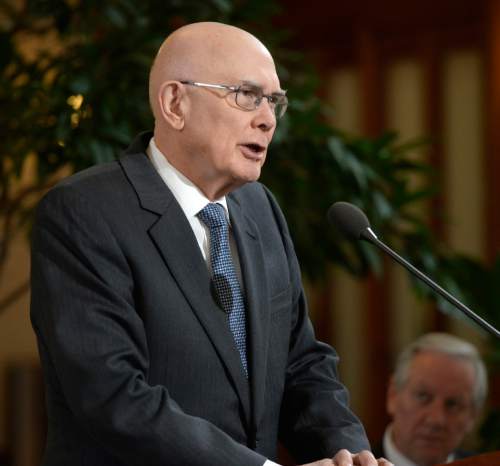This is an archived article that was published on sltrib.com in 2015, and information in the article may be outdated. It is provided only for personal research purposes and may not be reprinted.
LDS apostle Dallin H. Oaks set off a global chain reaction among Mormons this week, when he said he wasn't sure apologizing for the faith's past rhetoric on homosexuality would be advisable.
"I know that the history of the church is not to seek apologies or to give them," Oaks said in an interview Tuesday. "We sometimes look back on issues and say, 'Maybe that was counterproductive for what we wish to achieve,' but we look forward and not backward."
The church doesn't "seek apologies," he said, "and we don't give them."
The Mormon leader made the same point, only stronger, Thursday during a video chat on Trib Talk by insisting that the word "apology" doesn't appear in LDS scriptures.
Many Mormons across social media have reacted with dismay at hearing an LDS apostle reject out of hand the idea of apologizing.
"I have to be honest, few actions or comments over the last few years from the church that I have committed to and served all my life, have stung so deeply and so personally than Elder Oaks' glib and dismissive remarks said today, after the LDS Church's press conference," Mormon filmmaker Kendall Wilcox wrote Tuesday on his Facebook page. "It has been hard to maintain composure."
Still, Wilcox said, he would take Oaks' words "as yet another challenge and opportunity to be stretched and expanded by the effort to empathize with his life and perspective. Empathy is not for wimps."
Salt Lake City lawyer Steve Evans, writing on the Mormon blog By Common Consent, took up the question of institutional LDS apologies.
"We've come close," Evans wrote. "Pastor Cecil Murray received a personal apology from President Gordon B. Hinckley for the church's participation in slavery and racism. In 2007, Elder Henry B. Eyring offered words of apology on behalf of church members at a memorial service for victims of the 1857 Mountain Meadows Massacre. The church also issued a public apology for performing baptisms for the dead on behalf of victims of the Holocaust."
The Church of Jesus Christ of Latter-day Saints doesn't apologize for "doctrines," the blogger noted. "Doctrines come from God; they don't change and we do not make excuses for them."
Everything else is "human," Evans wrote. "I think we can apologize, and have apologized, for messing things up and figuring things out as we go, and we do that once in a while."
Several By Common Consent commenters echoed that sentiment.
"Apologies can also have another really important effect of signaling to members that things have really changed or need to change," onecommenter wrote. "Sadly, I think this is now the case in the area of LGBT issues. I think it is clear that the church really does want us to deeply examine throughout the church how we treat our LGBT brothers and sisters. Yet, clearly that message is not clear for ever so many."
Apologies, especially "if they are rare and special," the commenter noted, "get significant attention and have serious symbolic weight."
A blogger who goes by Christer1979 at Feminist Mormon Housewives quoted the following verse from the Doctrine and Covenants, part of the LDS canon: "And now, behold, I say unto you, that the thing which will be of the most worth unto you will be to declare repentance unto this people, that you may bring souls unto me, that you may rest with them in the kingdom of my Father. "
The blogger does not need Mormon leaders "to pretend to be above apologies.
"My church membership was never about them," Christer wrote. "It is the things they taught me: Jesus Christ and his gospel. It is about hope and forgiveness and growing through our mistakes.
" ... I would have greater trust for my church leaders and their ability to help me follow Christ," the blogger added, "if they could candidly discuss the mistakes they've made and how they're becoming better."
Acknowledging when "we've hurt others and making restitution is no sign of weakness, but of emerging strength," Christer wrote. "And it's what Jesus has asked us to do. Surely we all learned that in Primary."
Mormons don't need their apostles and prophets to be infallible, she said. "We have Jesus for that."
Peggy Fletcher Stack





